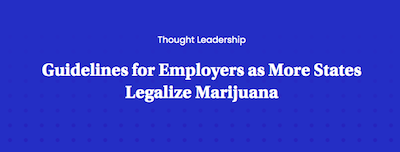
Authors

Timothy Hilton

Jenna Brofsky Senior Associate

Tracey Oakes O’Brien, Knowledge Manager, is a co-author of this content.
What is the dilemma faced by employers?
Employers, especially multi-state employers, face a complex patchwork of state laws legalizing marijuana and conflicting federal law when developing and implementing workplace drug policies that address marijuana usage. Because marijuana is still considered illegal under federal law, marijuana usage is not protected by federal laws, including the ADA. Any duty to accommodate marijuana users or to permit off-duty marijuana usage varies by state law. As a result, employers must be cognizant of whether state laws contain employment protections for employees who legally use marijuana. These employment protections can take the form of a requirement that employers accommodate marijuana use for medical reasons or of a prohibition against discrimination based on off-duty marijuana use.
Do the state marijuana legalization measures passed in November impose new obligations on employers?
Yes. The provisions applying to employers are explained below. Employers should be cautious when drug testing employees for marijuana in states that have legalized medical use or off-duty use of marijuana.
Arizona: Voters passed proposition 207 which legalizes the sale and possession of marijuana for adult, recreational use. In 2010, Arizona voters previously approved a ballot measure legalizing the use of marijuana for medical purposes. Proposition 207 explicitly provides that employers can maintain drug-free workplace policies and can continue to restrict the use of marijuana by employees or prospective employees. The proposition does not require employers to allow or accommodate the use, consumption, possession, transfer, sale or cultivation of recreational-use marijuana in the workplace. The proposition permits employers to prohibit or regulate conduct related to recreational marijuana usage on their property.
Mississippi: Initiative 65 requires the establishment of a medical marijuana program that permits individuals with specified debilitating medical conditions to obtain medical marijuana upon the certification of a licensed physician. The initiative does not require employers to provide accommodations to employees who use medical marijuana or to permit the use of medical marijuana in the workplace. Employers will be able to maintain a zero-tolerance drug policy according to the terms of the initiative.
Montana: Montana passed two complimentary ballot initiatives: initiative 118, which amends the Montana Constitution to establish the legal age for the purchase, use and consumption of marijuana as 21 years old, and initiative 190 (I-190), which legalizes the recreational use and possession of marijuana for adults over the age of 21. I-190 does not require employers to permit the use of marijuana in the workplace or on the employer’s property, or to accommodate employees who use marijuana. Additionally, the ballot initiative preserves the employer’s right to maintain a drug policy because it permits employers to decline to hire and to take adverse employment action against employees who violate the employer’s drug policy or who work under the influence of marijuana.
New Jersey: New Jersey voters approved a ballot measure legalizing the use of recreational marijuana for adults over the age of 21. The Cannabis Regulatory Commission will enact regulations to implement the measure. No specific information was provided on protections afforded to employees.
South Dakota: Constitutional Amendment A legalizes recreational use of marijuana for adults 21 years of age and older and requires the state legislature to pass laws providing for the medical use of marijuana. Measure 26 establishes a medical marijuana program for patients with serious health conditions. The provisions of Amendment A do not affect an employer’s ability to restrict the use of marijuana in the workplace or to prohibit employees from working under the influence. It also does not require employers to accommodate marijuana usage at the workplace. Measure 26 permits employers to prohibit employees from working while under the influence of marijuana and ingesting marijuana at the workplace. It also requires that employers treat employees who use medical marijuana the same as patients prescribed prescription drugs with regard to employment and drug testing, except to the extent the employer’s actions would conflict with an employer’s obligations under federal law or regulations.
What this means to you
Employers should review the state laws in the jurisdictions in which they operate, understand their rights, and consider adopting the following practices:
- No state law requires employers to either tolerate marijuana use at the workplace or employees who work under the influence of marijuana.
- Zero-tolerance drug policies can be maintained if employers are mandated to perform drug testing by federal statutes or regulations or employees are employed in safety-sensitive positions.
- In states with laws that have legalized marijuana but do not contain anti-discrimination or accommodation mandates for medical and recreational users of marijuana, employers can deny accommodations to employees who use medical marijuana and can test for marijuana. Caution should be exercised in enforcing zero-tolerance drug policies that include marijuana use because metabolites may remain in the blood even if the employee is no longer under the influence of marijuana.
- If state law requires employers to accommodate medical marijuana users, employers should take the following actions:
- Engage in the interactive process with the employee to ensure the medical reason for taking medical marijuana constitutes a disability and discuss the types of accommodations needed;
- Determine whether the employer can reasonably provide an accommodation to the employee; and
- Verify that the accommodation and disability does not present a safety hazard to the worker or other third parties and that the accommodation does not present an undue hardship on the employer.
- Review the employer’s drug-testing policy.
- In states where recreational or medical marijuana has been legalized, consider not testing for marijuana because the metabolites remain detectable for up to several days after using marijuana even though the employee is not under the influence of marijuana at the time of the test;
- Instead, train supervisors and managers to detect suspicious behavior indicative of marijuana intoxication;
- Test only employees that you have determined may be intoxicated based on reasonably suspicious behavior and document the behaviors on which the decision to test was based; and
- Discipline or take adverse employment action against employees who attempt to work while under the influence of marijuana or use marijuana while at the workplace in violation of the employer’s policies.
Contact us
If you have questions about the impact of state laws legalizing marijuana in the locations in which your business operates or has employees, contact Timothy Hilton, Jenna Brofsky or your Husch Blackwell attorney.
Tracey Oakes O’Brien, Knowledge Manager, is a co-author of this content.





